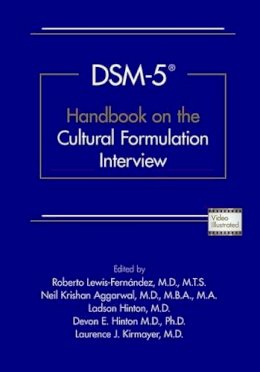
Stock image for illustration purposes only - book cover, edition or condition may vary.
Dsm-5(r) Handbook on the Cultural Formulation Interview
Rob Lewis-Fernandez
FREE Delivery in Ireland
Description for Dsm-5(r) Handbook on the Cultural Formulation Interview
Paperback. Editor(s): Lewis-Fernandez, Roberto; Aggarwal, Neil Krishan; Hinton, Ladson; Hinton, Devon Emerson; Kirmayer, Laurence J. Num Pages: 364 pages, 26 tables, 2 figures. BIC Classification: MJA; MMH. Category: (G) General (US: Trade). Dimension: 181 x 265 x 18. Weight in Grams: 580.
DSM-5 Handbook of the Cultural Formulation Interview provides the background, context, and detailed guidance necessary to train clinicians in the use of the Cultural Formulation Interview (CFI), which was created as part of the 2007-2013 DSM revision process. The purpose of the CFI—and this unique handbook—is to make it easier for providers to account for the influence of culture in their clinical work to enhance patient-clinician communication and improve outcomes. Cultural psychiatry as a field has evolved enormously from the days when it was principally concerned with epidemiological and clinical studies of disease prevalence; it now examines a multitude ... Read moreof issues, primary among them the differing patient, family, and practitioner models of illness and treatment experiences within and across cultures. The editors, all of whom have been intimately involved in the evolution of the field, have designed the book and accompanying videos for maximum instructional and clinical utility.
The Handbook boasts many strengths and useful features, including:
• A detailed description of each of the three CFI components: a core 16-item questionnaire, which can be applied in any clinical setting with any patient by any mental health clinician; an informant version of the core CFI used to obtain information from caregivers; and 12 supplementary modules that expand on these basic assessments. This material facilitates implementation of the CFI by clinicians.
• Over a dozen clinical vignettes are included to illustrate use of the three components, and the Handbook also includes multiple videos that demonstrate the application of portions of the core CFI, and several supplementary modules.
• Strategies for incorporating the CFI into clinical training are identified and discussed, furthering the objective of developing culturally-sensitive and astute practitioners.
• The theoretical bases of the CFI are explored, raising questions for discussion and identifying areas for further research.
The CFI is a valuable tool for all patients, not just those judged to be culturally different. The CFI has been called the single most practically useful contribution of cultural psychiatry and medical anthropology to clinical psychiatry, primary care, and medicine in general. DSM-5 Handbook on the Cultural Formulation Interview is the only book on the market that equips readers with the skills and insight to incorporate the CFI into practice, making it a critically important addition to the clinical literature.
Show Less
Product Details
Publisher
American Psychiatric Publishing
Place of Publication
VA, United States
Shipping Time
Usually ships in 4 to 8 working days
About Rob Lewis-Fernandez
Roberto Lewis-Fernández, M.D., M.T.S., is a Professor of Psychiatry at Columbia University Medical Center and is the Director of the New York State Center of Excellence for Cultural Competence and of the Hispanic Treatment Program at the New York State Psychiatry Institute, New York, New York. Neil Krishan Aggarwal, M.D., M.B.A., M.A., is Assistant Professor of Clinical ... Read morePsychiatry at Columbia University and Research Scientist at the New York State Psychiatric Institute, New York, New York Ladson Hinton, M.D., is a Professor of Psychiatry at the University of California Davis School of Medicine, Sacramento, California Devon E. Hinton M.D., Ph.D., is Associate Professor of Psychiatry at Massachusetts General Hospital, Harvard Medical School, Boston, Massachusetts Laurence J. Kirmayer, M.D., is James McGill Professor and Director of the Division if Social and Transcultural Psychiatry at McGill University, Montreal, Quebec, Canada Show Less
Reviews for Dsm-5(r) Handbook on the Cultural Formulation Interview
One of the greatest challenges in the field of cultural psychiatry over the past two decades—since the Outline for Cultural Formulation was published in DSM-IV—has been the need to develop a clinically effective set of questions that mental health practitioners could use to reliably describe the cultural context of psychological distress and psychiatric symptoms. This volume, the product of a ... Read moreDSM-5 work group dedicated to this challenge since 2007, comprises a major step forward. It includes a core, 16-item Cultural Formulation Interview, along with 12 supplementary modules on subjects such as the patient-clinician relationship, immigrants and refugees, children and adolescents, and caregivers. Its widespread use by clinicians and students should lead to more sensitive interactions with patients and their families in diverse and multicultural settings, as well as to more effective, person-centered clinical care." - Ronald Wintrob, M.D., Clinical Professor of Psychiatry and Human Behavior, Warren Alpert School of Medicine, Brown University "This companion piece to the Cultural Formulation Interview (CFI), which had its debut in the DSM-5, provides a high level overview of the CFI and its supplementary modules as well as a wonderfully practical guide for their implementation in clinical practice. The editors, a team of expert cultural psychiatrists led by Roberto Lewis-Fernandez, have assembled chapters that in aggregate, illuminate the principles of serious engagement with ‘culture’ as a means of re-contextualizing the lived experience of mental illness. The handbook highlights the clinical utility of the CFI for diagnostic assessment and as a tool for rendering treatment optimally relevant and acceptable to any patient. Within the CFI approach, culture is recast as not exotica or mere descriptor, but rather as fluid, dynamic, multi-dimensional, and intrinsic to patient understandings, values, and needs that, in turn, invariably shape the arc of treatment seeking and illness. This comprehensive overview of the CFI—and all that this approach entails—is an invaluable guide to navigating culture in the clinical encounter." - Anne E. Becker, M.D., PhD., Vice Chair and Maude and Lillian Presley Professor of Global Health and Social Medicine, Department of Global Health and Social Medicine, Harvard Medical School Show Less

